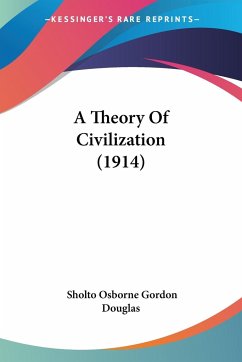
The Climax Of Civilization (1917)
Versandkostenfrei!
Versandfertig in 1-2 Wochen
24,99 €
inkl. MwSt.

PAYBACK Punkte
12 °P sammeln!
The Climax of Civilization is a book written by Correa Moylan Walsh and published in 1917. The book explores the idea that civilization has reached its peak and is on the brink of decline. Walsh argues that the progress of civilization has led to a loss of spiritual and moral values, and that the pursuit of material wealth has led to the destruction of the environment and the exploitation of other cultures.The book is divided into three parts. The first part examines the historical development of civilization, tracing its evolution from ancient times to the present. The second part analyzes th...
The Climax of Civilization is a book written by Correa Moylan Walsh and published in 1917. The book explores the idea that civilization has reached its peak and is on the brink of decline. Walsh argues that the progress of civilization has led to a loss of spiritual and moral values, and that the pursuit of material wealth has led to the destruction of the environment and the exploitation of other cultures.The book is divided into three parts. The first part examines the historical development of civilization, tracing its evolution from ancient times to the present. The second part analyzes the current state of civilization, highlighting the problems and challenges facing modern society. The third part offers a vision for the future, proposing a new direction for humanity that emphasizes spiritual and moral values, environmental stewardship, and social justice.Throughout the book, Walsh draws on a wide range of sources, including philosophy, history, and current events. He argues that the problems facing civilization are not simply technical or economic in nature, but are fundamentally spiritual and moral. He calls for a new approach to life that values simplicity, humility, and compassion, and that recognizes the interconnectedness of all living beings.Overall, The Climax of Civilization is a thought-provoking and insightful book that challenges readers to rethink their assumptions about progress and the meaning of life. It remains relevant today, as humanity continues to grapple with many of the same issues that Walsh identified over a century ago.This scarce antiquarian book is a facsimile reprint of the old original and may contain some imperfections such as library marks and notations. Because we believe this work is culturally important, we have made it available as part of our commitment for protecting, preserving, and promoting the world's literature in affordable, high quality, modern editions, that are true to their original work.












